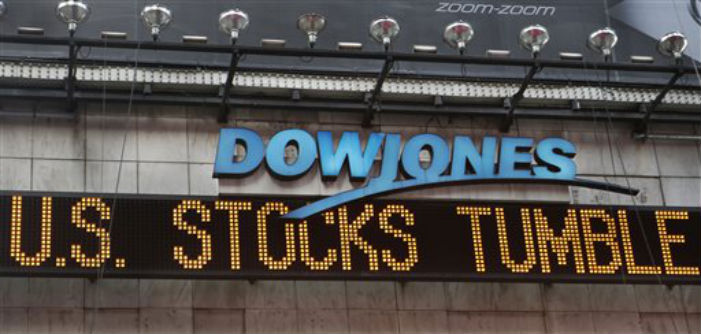US, European stocks sink amid economic, Ebola worries

NEW YORK–US and European stock markets sank Wednesday in a sea of worry over slowing global growth, a rising risk of eurozone deflation and the spreading Ebola epidemic.
Fear gripped investors after poor US economic data raised concerns that the US economy, at the moment a bright spot in the fragile global economy, may be succumbing to the eurozone’s woes and China’s slowdown.
Wall Street stocks finished a turbulent day in the red, paring losses from a huge midday drop spurred by worries over global economic weakness and the Ebola epidemic.
The Dow Jones Industrial Average fell 173.45 points (1.06 percent) to finish at 16,141.74. The blue-chip index had fallen more than 400 points earlier in the session.
The broad-based S&P 500 dropped 15.21 (0.81 percent) to 1,862.49, while the Nasdaq Composite Index lost 11.85 (0.28 percent) at 4,215.32.
The main indices were in negative territory throughout the session, with swings in stocks accompanied by big moves in other markets. Equity markets in Britain, France and Germany closed more than two percent lower, while yields on US Treasury bonds also sank below key benchmarks before rallying.
London’s benchmark FTSE 100 index dived 2.83 percent to 6,211.64, its lowest close since June 2013.
Frankfurt’s DAX 30 lost 2.87 percent and in Paris the CAC 40 sank 3.63 percent.
“Ultimately we have a heady mix of economic and geopolitical woes… Today has been an assault on all fronts and looking at the bloodbath that’s out there, you could be excused for thinking Halloween had come along two weeks early,” said Tony Cross, market analyst at Trustnet Direct.
High volatility
“We haven’t seen this level of volatility since 2011,” said Tyson McCabe, senior director of advisory services at the Nasdaq Stock Market.
“There are so many different data points coming in, be it Ebola or some of the weak US data points, that market participants are really struggling with where to get their read from.”
Wall Street opened sharply lower after the Commerce Department reported US retail sales dropped 0.3 percent in September, the first decline in seven months.
US producer prices fell in September for the first time since August 2013, pulled lower by falling energy and food prices, the Labor Department said in a report offering fresh evidence of weak inflationary pressures in the modestly growing economy.
“The very bad US figures are just adding to all the bad news we’ve had in Europe over the past few weeks,” said Saxo Banque analyst Andrea Tueni.
US stock indices then cut their losses but plunged again midday, soon after US health officials warned of more potential Ebola cases after a second health care worker in Dallas was diagnosed with the virus.
“Continued growth concerns in Europe, heightened geopolitical concerns, resurfacing peripheral eurozone debt worries, and deepening Ebola fears all amplified the palpable negativity emanating from the Street,” Charles Schwab said in a market note.
Dollar weakens
In foreign exchange deals, the dollar fell after the weak US data appeared to suggest the Federal Reserve could keep its near-zero interest rate policy longer than the mid-2015 timeline for a rate hike that had been expected.
The euro rose to $1.2834 around 2100 GMT from $1.2663 at the same time Tuesday in New York. The dollar fell to 105.91 yen from 107.02 yen the prior day.
The price of gold finished at $1,237.50 an ounce on the London Bullion Market from $1,234.75.
Investor sentiment in Europe turned sour early Wednesday in Europe after US pharmaceutical firm AbbVie announced that it had decided to reconsider its Shire takeover deal, citing a US crackdown on controversial so-called “tax inversions.”
The new US Treasury rules are designed to curb deals in which US companies merge with foreign businesses to relocate in a lower tax address.
Shire’s share price plunged 21.95 percent in London.
Oil markets moderated Tuesday’s steep losses. US benchmark West Texas Intermediate for November slipped six cents to $81.78, the lowest closing price since June 2012.
The European benchmark, Brent North Sea crude for delivery in November, which had plunged nearly $4 the previous day, shed $1.22 to close at $83.78 a barrel in London.
In Asia, stock markets rose Wednesday with bargain-hunters providing some lift after recent losses, while data showing Chinese inflation at a five-year low raised hopes for fresh economy-boosting measures from Beijing.